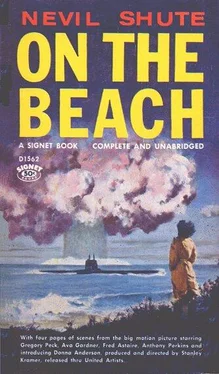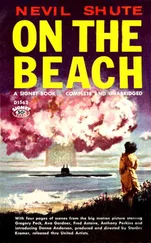He paused. "Well, that’s the bare bones of the theory. Most of the scientists disagree, and think that Jorgensen is optimistic. Because of the majority opinion nothing has been said about this on the wireless broadcasting, and we’ve been spared the press. It’s no good raising people’s hopes without foundation. But clearly, it’s a matter that must be investigated."
"I see that, sir," Dwight said. "It’s very important. That’s really the main object of this cruise?"
The admiral nodded. "That’s right. If Jorgensen is correct, as you go north from the equator the atmospheric radioactivity should be steady for a time and then begin to decrease. I don’t say at once, but at some point a decrease should be evident. That’s why we want you to go as far north in the Pacific as you can, to Kodiak and to Dutch Harbor. If Jorgensen is right, there should be much less radioactivity up there. It might even be near normal. In that case, you might be able to go out on deck." He paused. "On shore, of course, ground radioactivity would still be intense. But out at sea, life might be possible."
Peter asked, "Is there any experimental support for this yet, sir?"
The admiral shook his head. "Not much. The Air Force sent out a machine the other day. Did you hear about that?"
"No, sir."
"Well, they sent out a Victor bomber with a full load of fuel. It flew from Perth due north and got as far as the China Sea, about latitude thirty north, somewhere south of Shanghai, before it had to turn back. That’s not far enough for the scientists, but it was as far as the machine could go. The evidence they got was inconclusive. Atmospheric radioactivity was still increasing, but towards the northern end of the flight it was increasing slowly." He smiled. "I understand the back-room boys are still arguing about it. Jorgensen, of course, claims it as his victory. He says there’ll be a positive reduction by the time you get to latitude fifty or sixty."
"Sixty," the captain said. "We can make that close inshore in the Gulf of Alaska. The only thing up there is that we’d have to watch the ice."
They discussed the technicalities of the operation again for a time. It was decided that protective clothing should be carried in the submarine to permit one or two men to go on deck in moderate conditions and that decontamination sprays should be arranged in one of the escape chambers. An inflatable rubber dinghy would be carried in the superstructure, and the new directional aerial would be mounted on the aft periscope.
Finally the admiral said, "Well, that clears the decks so far as we are concerned. I think the next step is that I call a conference with C.S.I.R.O. and anybody else who may be concerned. I’ll arrange that for next week. In the meantime, Commander, you might see the Third Naval Member or one of his officers about this dockyard work. I’d like to see you get away by the end of next month."
Dwight said, "I think that should be possible, sir. There’s not a lot of work in this. The only thing might hold us up would be the measles."
The admiral laughed shortly. "The fate of human life upon the world at stake, and we’re stuck with the measles! All right, Captain—I know you’ll do your best."
When they left the office Dwight and Peter separated, Dwight to call at the Third Naval Member’s office, and Peter to go to find John Osborne in his office in Albert Street. He told the scientist what he had learned that morning. "I know all about Jorgensen," Mr. Osborne said impatiently. "The old man’s crackers. It’s just wishful thinking."
"You don’t think much of what the aeroplane found out—the reduced rate of increase of the radioactivity as you go north?"
"I don’t dispute the evidence. The Jorgensen effect may well exist. Probably it does. But nobody but Jorgensen thinks that it’s significant."
Peter got to his feet. "I’ll leave the wise to wrangle," he quoted sardonically. "I’ve got to go and buy a playpen for my eldest unmarried daughter."
"Where are you going to for that?"
"Myers’."
The scientist got up from his chair. "I’ll come with you. I’ve got something in Elizabeth Street I’d like to show you."
He would not tell the naval officer what it was. They walked together down the centre of the traffic-free streets to the motorcar district of the town, turned up a side street, and then into a mews. John Osborne produced a key from his pocket, unlocked the double doors of a building, and pushed them open.
It had been the garage of a motor dealer. Silent cars stood ranged in rows along the walls, some of them unregistered, all covered in dust and dirt with flat tires sagging on the floor. In the middle of the floor stood a racing car. It was a single seater, painted red. It was a very low-built car, a very small car, with a bonnet sloping forward to an aperture that lay close to the ground. The tires were inflated and it had been washed and polished with loving care; it shone in the light from the door. It looked venomously fast.
"My goodness!" Peter said. "What’s that?"
"It’s a Ferrari," said John Osborne. "It’s the one that Donezetti raced the year before the war. The one he won the Grand Prix of Syracuse on."
"How did it get out here?"
"Johnny Bowles bought it and had it shipped out. Then the war came and he never raced it."
"Who owns it now?"
"I do."
"You?"
The scientist nodded. "I’ve been keen on motor racing all my life. It’s what I’ve always wanted to do, but there’s never been any money. Then I heard of this Ferrari. Bowles was caught in England. I went to his widow and offered her a hundred quid for it. She thought I was mad, of course, but she was glad to sell it."
Peter walked round the little car with the large wheels, inspecting it. "I agree with her. What on earth are you going to do with it?"
"I don’t know yet. I only know that I’m the owner of what’s probably the fastest car in the world."
It fascinated the naval officer. "Can I sit in it?"
"Go ahead."
He squeezed down into the little seat behind the plastic windscreen. "What will she do, all out?"
"I don’t really know. Two hundred, anyway." Peter sat fingering the wheel, feeling the controls. The single seater felt delightfully a part of him. "Have you had her on the road?"
"Not yet."
He got out of the seat reluctantly. "What are you going to use for petrol?"
The scientist grinned. "She doesn’t drink it."
"Doesn’t use petrol?"
"She runs on a special ether-alcohol mixture. It’s no good in an ordinary car. I’ve got eight barrels of it in my mother’s back garden." He grinned. "I made sure that I’d got that before I bought the car."
He lifted the bonnet and they spent some time examining the engine. John Osborne had spent all his leisure hours since they returned from their first cruise in polishing and servicing the racing car; he hoped to try her out upon the road in a couple of days’ time. "One thing," he said, grinning in delight, "there’s not a lot of traffic to worry about."
They left the car reluctantly, and locked the garage doors. In the quiet mews they stood for a few moments. "If we get away upon this cruise by the end of next month," Peter said, "we should be back about the beginning of June. I’m thinking about Mary and the kid. Think they’ll be all right till we get back?"
"You mean—the radioactivity?"
The naval officer nodded.
The scientist stood in thought. "Anybody’s guess is as good as mine," he said at last. "It may come quicker or it may come slower. So far it’s been coming very steadily all round the world, and moving southwards at just about the rate that you’d expect. It’s south of Rockhampton now. If it goes on like this it should be south of Brisbane by the beginning of June—just south. Say about eight hundred miles north of us. But as I say, it may come quicker or it may come slower. That’s all I can tell you."
Читать дальше












